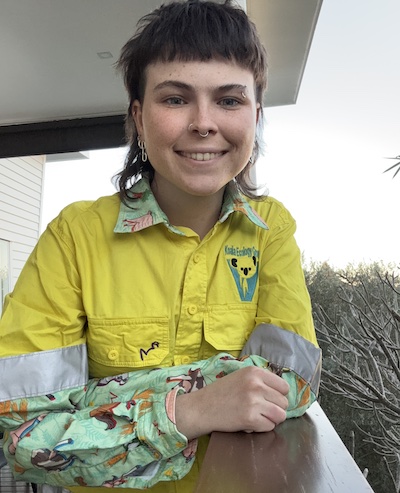 University of Queensland Honours student Madeleine Harding has taken out the A.G. Lyne Award at the recent Australian Mammal Society Annual Scientific Meeting.
University of Queensland Honours student Madeleine Harding has taken out the A.G. Lyne Award at the recent Australian Mammal Society Annual Scientific Meeting.
The prestigious award is given to the best poster presentation by a student member and celebrates the life of Gordon Lyne (1919–1986), a long-standing member of the Society and past president.
Ms Harding’s captivated judges with her research on engaging more private landholders in adopting on-property conservation actions.
“Much of the remaining koala habitat occurs on privately owned land, and therefore private properties represent conservation opportunities for enhancing koala habitat,” she said.
“The issue however is that in many regional landscapes, conservation efforts are hindered by low participation rates by landholders in existing conservation programs, for example, Land for Wildlife.
“I therefore developed a theoretical framework, aptly named the ‘Koala Conservation Framework’ that guides users to management activities that are tailored to the characteristics of an individual property and the lifestyle of the owner of that property.
“In theory, landholders will be more likely to adopt these recommended actions and thus conservation areas can be expanded on private properties and greater involvement by landholders in preserving koala habitat can be facilitated.”
The event was Ms Harding’s first conference, a pivotal and influential step in the lives of all young researchers.
“I was thrilled to be presenting my research on koala conservation on privately owned land, accompanied by my supervisor Dr Bill Ellis and the guys from the Koala Ecology Group,” she said.
“Their support and guidance have meant the world, and I have been provided with the best foray into research any student could hope for.
“And, as a short-term goal, I would like to pursue my research through the completion of a PhD.
“Weirdly, I had a thesis shaped hole left in me after I submitted my Honours, and I think a PhD is the likely next step.”
Ms Harding hopes that, in the long run, she can play a role in helping preserve the incredible biodiversity in Australia.
“Our flora and fauna is particularly unique, but unfortunately, we’re in the midst of an extinction crisis, and therefore I feel very strongly about contributing to solutions,” she said.
“I’m especially passionate about helping bridge the gap between conservation and community – finding ways to make research and environmental action more accessible and relevant to the people who live on and interact with the land.
“Raising awareness and encouraging a stronger connection to the environment is, I believe, a vital part of creating lasting change.”



